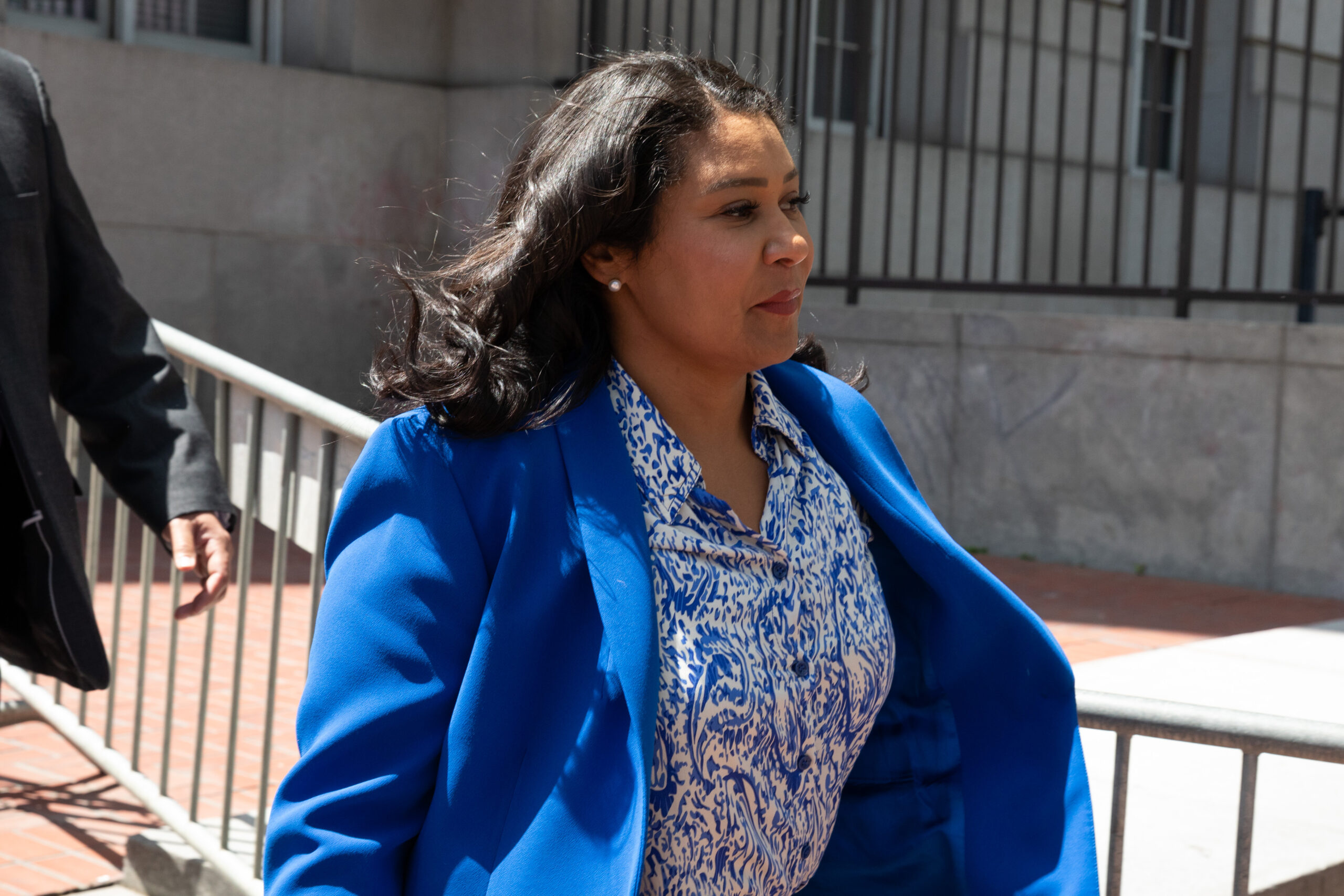After a long-planned hearing at United Nations Plaza was cut short by hecklers on Tuesday, San Francisco Mayor London Breed and the Board of Supervisors reconvened inside City Hall for a more substantive discussion about the city’s drug crisis—and the role of law enforcement in pressing people into treatment.
The chaotic, aborted open-air hearing was interrupted by jeers and culminated in the arrest of a woman who threw a brick in the direction of the politicians, striking a high school student.
Board of Supervisors President Aaron Peskin had begun to ask Breed whether she would commit to opening an emergency operations center to coordinate the local and regional agencies involved in shutting down open-air drug-dealing, a request he outlined in a Monday letter.
Before the outdoor hearing was shut down, Breed spoke forcefully about the need for policy changes that would introduce stiffer consequences for people involved in the city’s proliferating drug trade. Facing the likelihood of challengers in her 2024 reelection campaign, Breed said she was “putting everything on the line.”
“The people who live here, the folks who work here and the people who experience these challenges every single day, they deserve better,” she said. “Why should someone else’s rights be put before their needs and their safety and what they deserve, too, in a place like San Francisco that claims to be so compassionate and liberal. What about them?”
In a statement released Tuesday evening, Peskin said the city has the “resources right now to close down the open-air drug supermarkets” and described the violent protestor as a demonstration of the city’s disorganization, a problem caused by a lack of collaboration among the city’s executive and legislative branches and state and federal agencies.
“If we can’t guarantee everyone’s safety when the mayor and her security team are present—we have lost control of our public realm,” Peskin said. “And that is our shared mission: to regain control of all of our public spaces, so that they are safe and clean for everyone always. We simply can’t defend this status quo and we must continue to demand change.”
Once the group reconvened at City Hall, Peskin reiterated his question: Would Breed “stand up a sustained operation center” that could help shut down drug activity in UN Plaza and elsewhere in the Tenderloin, South of Market and the Mission?
Peskin compared the drug crisis to the Covid pandemic, during which time the city ran an operations center to tackle the public health emergency. Along with staff from other city departments, supervisors worked shifts at the city’s Covid operations center.
“We did an extraordinary job, and everybody was there,” Peskin said. “We were doing it in real time.”
Breed didn’t explicitly commit to setting up a similar operations center for the drug crisis but said she welcomed “the opportunity to work with the board on shutting open-air drug dealing down” and urged supervisors to pass her public safety budget without reductions and refrain from what she called “continued micromanaging” by the board.
Breed is expected to announce her proposed citywide budget on or around June 1.
Earlier Tuesday, the city’s Department of Emergency Management confirmed a pilot program, set to be introduced in Breed’s budget, that would “address situations when someone is so far under the influence of drugs that they may pose a danger to themselves or others.”
Supervisors told The Standard that the program would permit authorities to arrest people using drugs in public—a policy that could ruffle feathers among some members of the board along with critics of policing.
Supervisor Dean Preston, a frequent police critic, denounced the idea as “reactionary, cruel and counterproductive.” Supervisor Matt Dorsey, a recovering addict, wrote that more aggressive policies would promote “detox, stabilization and assessment” for people addicted to drugs.
At Tuesday’s board meeting, Breed said that she was “proposing changes to our state law, and we will be enacting local programs to try to end this disruptive behavior,” alluding to the pilot program that would allow for enforcement of public intoxication laws.
“What do we do about those who are struggling with addiction on our streets and they refuse services?” Breed added. “Because as much as shutting down drug markets, it’s also about making it clear that problematic behavior will not be tolerated on our streets.”
Breed described “an important meeting” with Police Chief Bill Scott, District Attorney Brooke Jenkins, U.S. Speaker Emerita Nancy Pelosi and U.S. Attorney Ismail Ramsey, saying that she was “not at liberty to speak on the details, but know that everyone is focused on this very important issue; all of these partnerships and efforts matter.”
She also thanked Gov. Gavin Newsom for providing some resources from the California Highway Patrol and the California National Guard in efforts against the drug crisis and gave an emotional defense of law enforcement officers and street ambassadors working in the city’s troubled areas daily—including at the site of Tuesday’s chaotic public hearing.
“There’s still really hardworking, dedicated city employees who are putting their lives on the line every single day, and they don’t even get a look,” she said. “And most of the time in this board chamber, they get ridiculed, they get disrespected and they get treated like a punching bag.”
